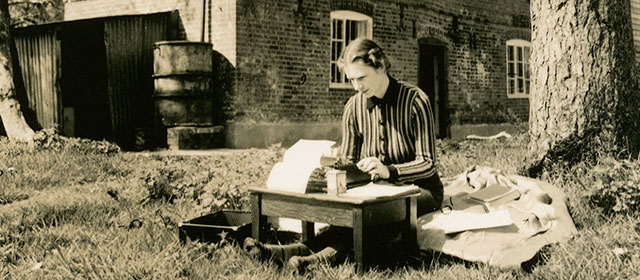He korero whakarapopoto
The first novels
Fiction about New Zealand appeared in the late 18th century, and the first home-grown novels were published in the 1860s. Samuel Butler, author of the 1872 novel Erewhon, began his career in Canterbury.
1880s to 1910s
In the 19th century romance was a popular subject, especially for women writers. Authors also wrote about Māori, and about pioneer life, farming and the bush.
Katherine Mansfield
Born in Wellington, Katherine Mansfield went to England in 1908, aged 19. She became internationally known for her short stories, some of which were set in Wellington. One of the founders of literary modernism, Mansfield published three books before her death from tuberculosis in 1923.
Women writers, 1920s and 1930s
Prominent women writers of the 1920s and 1930s included Jane Mander, who wrote The story of a New Zealand river (1920), and Robin Hyde, author of The godwits fly (1938). Ngaio Marsh published 32 detective novels, starting in 1934.
Male writers, 1930s onwards
A distinct New Zealand voice emerged in the 1930s and 1940s, and short stories dominated fiction. Frank Sargeson wrote about single men. John Mulgan’s Man alone (1939) became a cultural stereotype, of the Kiwi bloke who goes it alone. From 1960 Barry Crump also wrote about men alone in his comic novels.
David Ballantyne and Ronald Hugh Morrieson became well-known years after their deaths. Maurice Shadbolt and Maurice Gee were both prolific, well-known novelists.
Janet Frame
Janet Frame is the best-known New Zealand novelist of the 20th century. Some of her fiction draws on her life experiences, including eight years in mental hospitals. Frame died in 2004.
1970s and 1980s
The women’s movement influenced women writers, including Fiona Kidman and Sue McCauley. Male writers included C. K. Stead, Owen Marshall and Lloyd Jones.
Fiction today
The number of fiction writers and published works has grown hugely since the 1970s. There was more international interest in New Zealand fiction, more writing fellowships and more creative writing courses. Significant authors include Elizabeth Knox, Emily Perkins and Eleanor Catton, whose novel The luminaries won the Man Booker prize in 2013.
Māori and fiction
In the 1950s and 1960s the journal Te Ao Hou encouraged Māori writers. In 1972 Witi Ihimaera published Pounamu, pounamu, the first short-story collection by a Māori author. He continued writing into the 2000s. Patricia Grace’s novels and short stories have been published around the world.
In 1985 Keri Hulme’s novel the bone people won the Booker Prize. Alan Duff’s novel Once were warriors (1990) was made into an acclaimed film.





